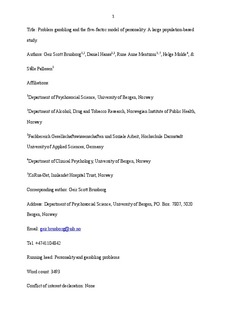Problem gambling and the five-factor model of personality: A large population-based study
Journal article

View/
Date
2016Metadata
Show full item recordCollections
- Artikler [5068]
- Publikasjoner fra CRIStin FHI [7544]
Abstract
Knowledge of the personality characteristics of individuals who develop gambling problems is important for designing targeted prevention efforts. Previous studies of the relationship between the five-factor model of personality and gambling problems were based on small samples not representative of the general population. We estimated differences in Neuroticism, Extroversion, Intellect, Agreeableness and Conscientiousness between non-problem gamblers and individuals with low, moderate and severe gambling problems.Cross-sectional surveyNorway10 081 (51.5% female) individuals aged 16 to 74 years (mean age 46.5 years).The Problem Gambling Severity Index, The Mini-International Personality Item Pool, and demographic variables. Differences between groups of gamblers were analyzed by ordinary least squares regression models separately for each personality trait adjusting for gender, age, cohabitation, level of education and work status.Gamblers with low level, moderate level and severe level of gambling problems differed significantly from non-problem gamblers in Neuroticism (b = 0.16, 0.34 and 0.66 respectively, all p < .001) and Conscientiousness (b = -0.13, -0.27, and -0.44 respectively, all p < .001). Moderate and severe problem gamblers differed from non-problem gamblers in Agreeableness (b = -0.21, p < .001 and b = -0.20, p = .028 respectively). In addition, gambling problems were much more prevalent among men than women, and more prevalent among those who live alone, individuals without tertiary education, and among those who are unemployed or on disability pension.A higher level of problem gambling severity appears to be associated with higher scores on Neuroticism, and with lower scores on Conscientiousness and Agreeableness in the Mini-International Personality Item Pool.
Description
-